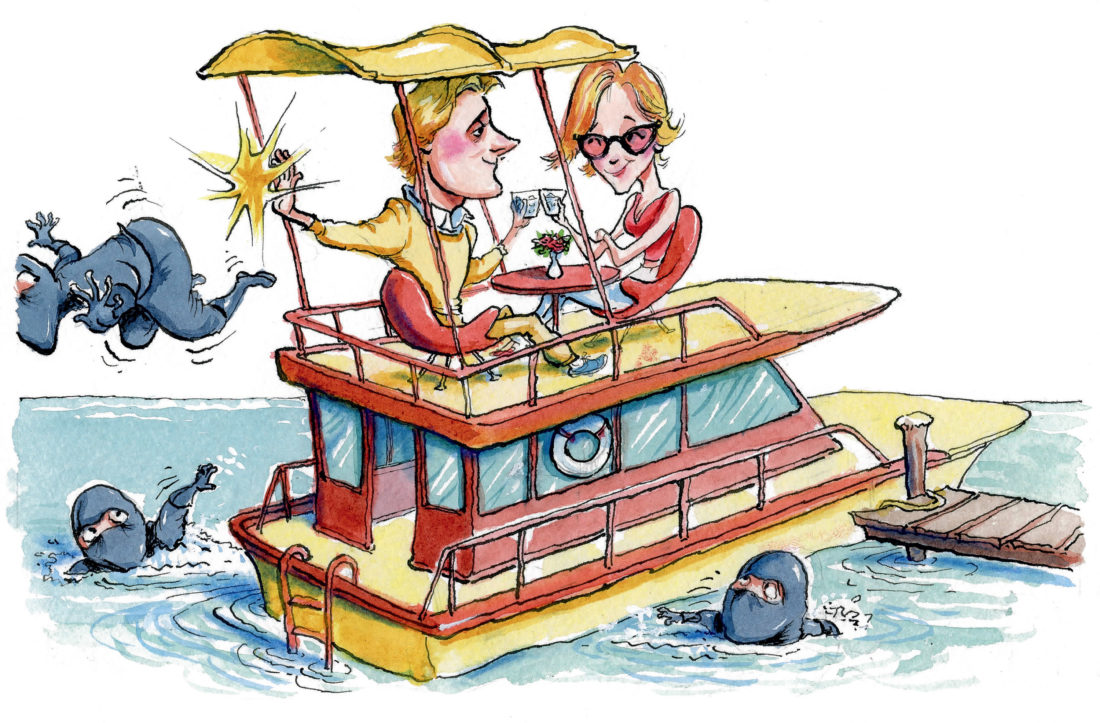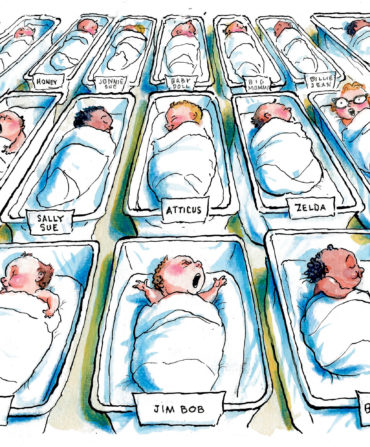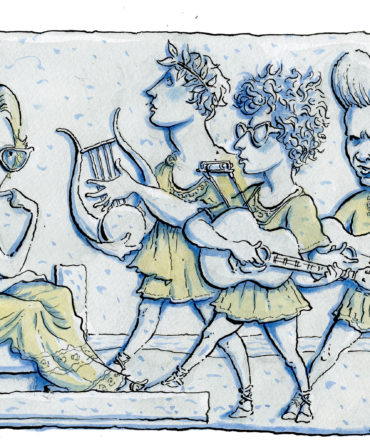In my early twenties, I left Newsweek magazine’s Washington bureau, where I’d toiled all through college, and took a job at the Orlando Sentinel. Everybody thought I was crazy, but I was looking forward to the sunny clime and lesser cynicism that awaited me in Central Florida, and at the appropriately boozy send-off, my dear friend and colleague Elaine Shannon handed me a stack of paperbacks that turned out to be the Travis McGee series by John D. MacDonald. The novels were set in Fort Lauderdale, and though I was going to a decidedly landlocked part of the state, I became immediately addicted. During my happy twenty-two months at the paper, I read twenty out of the twenty-one books in the series, all of which include a color in the title, as in The Turquoise Lament or Bright Orange for the Shroud. Thirty-plus years later, I am still saving the last one, The Lonely Silver Rain, because I can’t bear to bid Travis goodbye, and no wonder.
Travis McGee is six foot four inches tall and weighs 205 pounds. He is, according to a character in The Long Lavender Look, “a big tall guy, kind of battered here and there, with a lot of tan and real pale gray eyes.” His home is a houseboat called The Busted Flush, his ride is a 1936 Rolls-Royce converted into a pickup truck and dubbed Miss Agnes, and his best friend is an erudite economist named Meyer. Travis makes his living as a self-described “salvage consultant,” which in extremely loose terms means he recovers other people’s property for a 50 percent fee. Mostly he rescues a
lot of dames in distress and rights an even bigger amount of wrongs—but fails in both quests enough to keep him philosophical.
He brakes for raccoons (on the grounds that they are “more affable, intelligent, and tidy than the average meathead that wants them eliminated”), was an environmentalist long before Carl Hiaasen’s characters lamented the loss of the Florida that was, and has a deep-seated sense of honor. In many ways he is a precursor of Lee Child’s Jack Reacher, though he has far more possessions and is fond of beverages other than Reacher’s ubiquitous black coffee. Travis’s drink of choice is a double Plymouth gin on the rocks, straight with a twist, but in a pinch he’ll settle for Booth’s.
I bring up these books partly because they are excellent material with which to catch the waning days of summer before they slip entirely into autumn. But mainly because I wonder what Travis and his creator would have made of the current #MeToo era. Travis, at least, would have fared pretty well because he is almost always the seducee. His moves, much like those of James Bond, consist of simply being himself while women go bananas. He has been known to fall hard, but generally for members of the opposite sex who are evolved enough to appreciate, in the words of one, a fully “grown-up man.” At one point in The Long Lavender Look, he says, “I am a grown-up making choices. And sufficiently grown up to live with the choices I make.” Wow. When I read that, I realized how many men of late have been acting like spoiled five-year-olds without a shred of honor—or, most glaring, imagination.
The current crop of mall trollers, drawers droppers, and bathrobe openers would do well to try to muster some. Even if you are not remotely as much of a bona fide dreamboat as Travis, you could at least polish a few lines. The first love of my life struck gold when he told me he liked my handwriting as I scrawled out a check for my substantial tab at the late, great One Block East, the bar in my hometown. It may not have been the strongest opener, but hey, it was what he had to work with. By the end of the summer, I was mad for the man. He introduced me to Richard Brautigan (this was the 1970s, after all) and played Hoyt Axton for me on the guitar. All these guys exposing themselves willy-nilly would do well to read some books and learn a talent.
I was lucky enough to be raised in the South around a whole bunch of guys who genuinely liked women. And like Travis, each is supremely comfortable in his own skin. The novelist Padgett Powell once wrote a piece in Esquire in which he told the story of a friend of his who married his wife due to her extraordinary ingenuity on a fishing trip. There was a bream frenzy and the bait was running low, so the woman in question started tearing the catalpa worms in half. It was their first date, but it sealed the deal. Powell’s subject was the allure of Southern women, but the same qualities define the allure of Southern men. You want a guy to be game, to look you square in the eye and be willing to meet you halfway when it comes to bait or bed or most things in between.
And then there is the all-important quality of resourcefulness, of being at the ready no matter the circumstance. Last winter my friend Jessica Lange and I were on our way to visit Sky Lake, an abandoned channel of the Mississippi River that is home to a virtual cathedral of thousand-year-old bald cypress trees. Jessica wanted to take some photos, and my father had been after me to go ever since he helped get a walkway built through the preserve, so off we went in the middle of one of the wettest winters on record. Everything was fine until Siri, as Siri is wont to do, led us down a road that may have looked good on an electronic map but in reality was an unpaved mud slop in which we promptly got stuck. Needless to say, there was no traffic, but I had a single bar on my phone and within seconds I’d called two men I know well and love a lot, Humphreys McGee and Hank Burdine, each of whom is in possession of a large pickup and some chain. While they debated which of them was closer, we were spotted by some chivalrous duck hunters in search of an afternoon blind. Within minutes we’d been hauled out of the muck and escorted to Sky Lake, which turned out to be one of the most breathtaking places either of us had ever seen. That night, over steaks at Doe’s Eat Place, we recalled another time Humphreys had been set on go. We’d been driving through Rosedale, and Jessica (who has the softest heart when it comes to dogs of anyone I’ve ever known) had spotted what looked like a half pit bull, half Lab stray with a gash in its side. There was nothing to do but pull into the Double Quick for some chicken tenders, which the dog gratefully wolfed down. By the time we made it to Greenville, it was dark, and Jessica could not stop worrying about that dog. Over dinner (at Doe’s, naturally) Humphreys said he’d go back with her the next morning to try to find it.
At first light they had piled into Humphreys’s truck with his devoted golden retriever, Bess, and hit the road. Despite their best efforts, they never found the dog. But they tried. Humphreys did not treat Jessica as though she were crazy as a loon to go in search of a lone stray in not all that small a town. He took her and the mission seriously, and even though they did not succeed, they had a hell of a story to tell, one that we jovially (and, yes, a little admiringly) retell all the time.
So here’s the thing: If you want the girl, study. When you utter some lines, mean them. Travel with a winch and a chain. Go after maimed dogs. Take the woman you are in front of very, very seriously. Then and only then, she might make like Mary Chapin Carpenter and belt out “Shut Up and Kiss Me.” But you should wait for her cue. For more tips, tuck into John D. MacDonald. You won’t be sorry.
Want more Julia Reed? Her book South Toward Home is a collection of both rollicking and warm stories about the highs and lows of Southern life.








